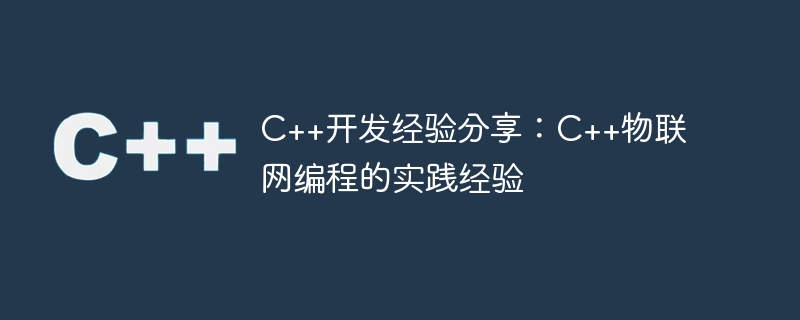

C Practical Experience in Internet of Things Programming
The Internet of Things (IoT) is a hot topic that has attracted much attention in recent years. It combines various devices and Sensors are connected to each other to achieve information sharing and intelligent control. In the development of the Internet of Things, C, as a powerful programming language, has the characteristics of high performance and efficiency, so it has a wide range of applications in the field of the Internet of Things. In this article, I will share some practical experience accumulated in C IoT programming, hoping to provide some useful reference for developers.
Before programming the Internet of Things in C, you first need to understand the communication protocol of the Internet of Things. Commonly used protocols in the Internet of Things include MQTT, CoAP, HTTP, etc. Each protocol has its own characteristics and applicable scenarios. For example, MQTT is a lightweight publish/subscribe messaging protocol suitable for transmitting small data, while CoAP is an application layer protocol designed for constrained environments and suitable for resource-constrained devices. Understanding the characteristics of these protocols can help developers choose the appropriate protocol for development.
In C IoT programming, choosing the appropriate libraries and frameworks is crucial to improving development efficiency and program performance. For example, the open source Paho MQTT C library provides a C client implementation of MQTT, which can help developers quickly build MQTT communication applications. In addition, the Boost library also provides a wealth of functions and tools to help developers write high-performance network applications. Choosing the appropriate libraries and frameworks can reduce development costs and improve code quality.
In IoT applications, error handling and logging are crucial, especially for device-to-device communication. communication. C language provides rich error handling mechanisms and logging tools. Developers should make full use of these tools to ensure the stability and reliability of the program. When writing IoT applications, you must fully consider various possible abnormal situations, write corresponding processing logic, and record relevant log information in a timely manner to facilitate troubleshooting and problem solving.
Since IoT devices usually have resource-limited characteristics, such as memory, processor, etc., in C IoT Programming requires special attention to performance and resource management. Developers should design and optimize code through reasonable algorithms to reduce the program's memory footprint and CPU resource consumption as much as possible. In addition, for embedded devices, it is particularly necessary to consider the power consumption of the program and the amount of data transmission, so as to extend the battery life of the device as much as possible.
In IoT applications, security is always an important issue. C language provides a wealth of encryption algorithms and security frameworks, and developers need to make full use of these tools to ensure the security of communication data. Using the SSL/TLS protocol to encrypt communication data and adopting appropriate key management and authentication mechanisms can effectively improve the security of IoT applications.
Summary:
C, as a high-performance and efficient programming language, has a wide range of applications in the field of Internet of Things. Developers can be better equipped for C IoT programming by understanding IoT protocols, choosing appropriate libraries and frameworks, good error handling and logging, optimizing performance and resource management, and security considerations and encrypted communication. We hope that the practical experience shared in this article will be helpful to developers in their application and practice in the field of Internet of Things.
With the continuous development of Internet of Things technology, I believe that the application of C in the field of Internet of Things will become more and more extensive. At the same time, we also hope that developers can continuously improve their skills in C Internet of Things programming through continuous practice and exploration. capabilities and contribute to the development of the Internet of Things.
The above is the detailed content of C++ development experience sharing: Practical experience in C++ IoT programming. For more information, please follow other related articles on the PHP Chinese website!
 What are the applications of the Internet of Things?
What are the applications of the Internet of Things? The m2m concept in the Internet of Things
The m2m concept in the Internet of Things What are the differences between c++ and c language
What are the differences between c++ and c language Recommended learning order for c++ and python
Recommended learning order for c++ and python Cost-effectiveness analysis of learning python and c++
Cost-effectiveness analysis of learning python and c++ Is c language the same as c++?
Is c language the same as c++? Which is better to learn first, c language or c++?
Which is better to learn first, c language or c++? The difference and connection between c language and c++
The difference and connection between c language and c++



